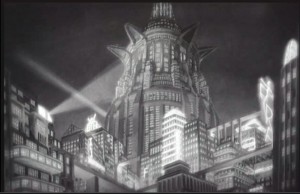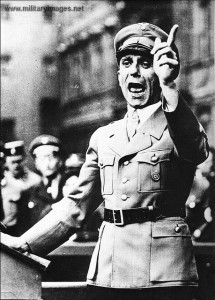Upon reflecting on Fritz Lang’s 1927 film “Metropolis” a couple of major themes resonated more than all others. The first being the dystopia vision of the future and the second: a sense of hope that circumstances can change. The characters in this film all play a role in conveying those themes. Joh Fredersen, the man at the helm of this Metropolis is an embodiment of the Bourgeoisie and his son Freder, is characterized as the mediator between him and the underground working class. Maria is the agent of change, whether it be change for the good, or when she is a robot, change for the worse. Though there are many things to dissect in this film, the most interesting element was this: the political change that this film forecasts.
When I think about the time frame for which this film was released in Germany I can’t help but think of the soon to come radicalism that overtook the nation through Nazi rule and the major focus that movement had on social change and hope for a better condition for the working class. Not unlike other nations, Germany’s work force in the early 20th century was dissatisfied to say the least with the working conditions and the living conditions that had grown out of control during the industrial transformation of Europe and with the major losses that had been sustained during WWI. This film was indeed meant for the masses, and very clearly was conveying not only a message of enlightenment but of radical social change. The German people of course, found refuge in a radical movement justified falsely in the name of these very notions. In fact, Joseph Goebbels was very impressed with the film along with other Nazi party members due to its social justice message.
This film in many ways gives a picture of what is to come politically during the 20th century in Europe and in the United States. Instead of a political Bourgeoisie in command of the government, a strong worker’s union movement would take place during this time. Even here in Canada, it is at this point in history, after WWI that we begin to see radical change take place politically in the form of the Cooperative Commonwealth Federation. In the United States, this political transformation is through the Democratic Party and the New Deal efforts by the Roosevelt Administration.
The reason for pointing out this political shift is that because of this political shift in the early 20th century, we begin to see a change in how cities are planned and how poverty is dealt with. Cities, as we begin to see in the 1800’s are now more than ever, focused on addressing mass poverty and improving the circumstances of the proletariat. Of course, urban planning will follow suit around Europe as different governments take very different approaches to coping with widespread poverty.



Perhaps the most appealing part of the message, for the Nazis, was this idea of cooperation between capital and labour (the head and the hands) – ultimately, the workers’ revolution was only destructive; the take-home message of the film is that a brighter day emerges as a result of the reconciliation of capital and labour – which is the essence of corporatism, a key element of Fascism. In corporatism, class conflict is eliminated and replaced by cooperation (with capital, obviously, having the upper hand.) The unifying factor in Metropolis is the heart (Feder) – in Fascism, it is the State. One wonders, though – would Fritz Lang have approved of fascism?
That is an interesting point, and after investigating somewhat further into Fritz Lang’s own synopsis on the film, it’s difficult to say whether he would approve of it or not. From what he said, he was not as politically motivated as what people were concluding. He mentioned that he didn’t even like the film after a while. But putting myself in his shoes and in any German shoes at the time, I can see why such a change would be appealing. I very much got the impression from him though that he may have made those comments to stay politically neutral in order to sell his film based on its technological merits rather than it’s inspiring political message. Apparently shortened and edited versions were released in other countries.
Very interesting connection to Fascism in Germany – I had not thought of that, but the time frame fits very well. I agree with you, however, that I do not see the film or Fritz Lang being very politically motivated. It seems to me that Lang’s sole purpose was to depict the deplorable conditions of the working class, promote awareness for their cause, and reveal an open-ended way out. In my opinion, the political implications of his film are left wide open to personal interpretation. Depending on the context, one could assume that the conclusion would come in the form of Nazi Fascism, or Soviet Communism, or even Western ‘social democracy’. And, as you mentioned, the history of the past 100 years reveals this very diversity – almost all nations have attempted to deal with the problems depicted in the film, but in very different ways.
Very interesting connection to Fascism in Germany – I had not thought of that, but the time frame fits very well. I agree with you, however, that I do not see the film or Fritz Lang being very politically motivated. It seems to me that Lang’s sole purpose was to depict the deplorable conditions of the working class, promote awareness for their cause, and reveal an open-ended way out. In my opinion, the political implications of his film are left wide open to personal interpretation. Depending on the context, one could assume that the conclusion would come in the form of Nazi Fascism, or Soviet Communism, or even Western ‘social democracy’. And, as you mentioned, the history of the past 100 years reveals this very diversity – almost all nations have attempted to deal with the problems depicted in the film, but in very different ways.